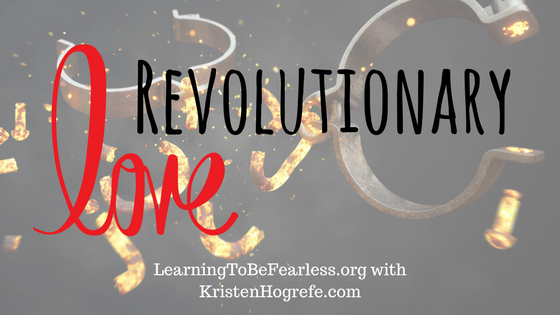Revolutionary Love
Love perseveres in spite of obstacles. Love gives without any guarantee of receiving. Love sacrifices until it hurts and then sacrifices some more.
If I told you those themes are part of my latest novel, you might guess I’m a romance writer, right? Well, they are, but guess again. The Revolutionary is a dystopia.
Wait. Dystopia? You mean one of those futuristic novels so dark they make the problems of our own world look like a walk in the park? Yes and no. Though dystopian novels have certain bleak characteristics, I think that setting paints the perfect contrast to the hope characters are fighting (and sometimes dying) to gain.
How can a dystopia present an accurate view of love? I’m glad you asked.
#1 – Love perseveres in spite of obstacles.
Obstacles are everywhere in dystopian novels, and The Revolutionary is no exception. The first chapter in this sequel to The Revisionary opens with my heroine Portia in a satellite slave camp where prisoners die like rabbits, and no one cares—no one but Portia’s protector Gath. Whether he’s trying to shield her from the freezing wind or take a lash for her, he selflessly destroys his own health to preserve hers.
As a result, Portia struggles with guilt. Surely, he has already done enough for her. How can she ever repay him? But then, there are those horrible rumors about Gath. Does he feel he owes her a debt because the accusations are true?
But that’s the thing. Love doesn’t keep score. Whether or not Gath is as guilty as people say, Portia resolves to rescue him and the other prisoners.
#2 – Love gives without any guarantee of receiving.
When a spy ringmaster helps her escape the satellite, Portia could try to run and get her life back. But the reality is that without her new role as a plant inside the capital of Crystal, her brother and friends won’t have any chance of learning why the ruling Dome wants to execute prisoners in mass.
Plus, unless she takes this job, she’ll never learn if her long-time friend Luther is on her side and cares about her the way she does for him. But when she sees him again for the first time in months, her blood curdles. He keeps company with the ruling echelons, the very people who want her dead.
They seem stuck on two different ends of a pendulum, never knowing when their paths will cross and if they have the same motives. Yet they desire the other’s good, even when they don’t know what that will mean for them.
#3 – Love sacrifices until it hurts and then sacrifices some more.
When God reaches into someone’s life, He can transform even the cruelest person into a new creation. In Acts 9, the Bible tells the true story of the transformation of persecutor Saul into the Apostle Paul.
Gath’s character arc in some ways parallels that of Paul. His faith enables him to love others—even his tormentors—in a way few people understand.
And though he’s merely a shell of his old self, he volunteers for a one-way mission, even when he finally has a chance at his own happy ending.
True love is sacrificial, not thinking of its own interests but of “the interests of others” (Philippians 2:4 ESV).
Closing thought
Whew, heavy stuff, right? I didn’t say dystopias are all sunshine and roses, but even they can present a beautiful, though battered, representation of what true love looks like.
Maybe you’re thinking, “That’s all well and good for make-believe, but that’s not real life.” If fiction doesn’t mirror real life, then there’s no point in reading it.
Besides, real life offers its own examples. Just look through the Bible for story after story of sacrificial love in action.
- Jonathan willingly gave up his right to the throne for his friend David.
- Ruth turned her back on her own people to care for her mother-in-law.
- Esther faced the king on behalf of her people at the risk of her own life.
- The Apostle Paul endured unspeakable torture for the gospel’s sake.
- Then, there is the ultimate example, Jesus, who died on the cross for thankless sinners.
Sure, there are many failures in Scripture as well, but I find those examples encouraging, too. (And trust me, my characters make their fair share of mistakes.) However, through mistakes, we can discover second chances. In spite of past hurts, we can learn to love well.
Now that’s a revolutionary view of love.
~ Kristen
I’m grateful that this post first appeared on Christi Perry’s blog Not Born Fearless, which offers an honest, transparent look at dealing with fear and uncertainty in everyday life.
Tweetable
Revolutionary Love: Dystopias can reveal real love, too – @kjhogrefe (Click to Tweet)





